Quantifiers
Quantifiers are words that precede and modify nouns. They show how many things or how much of something we are talking about. Some quantifiers combine with countable nouns, some with uncountable and some with both kinds. In this article you will learn about most used quantifiers: a lot of, lots of, plenty of, few, a few, little, a little etc.

Quantifiers: A lot of, Lots of, Plenty of, Few, A Few, Little, A little
1. A lot of/ Lots of / A lot
A lot of and lots of have the same meaning, they both mean a large amount or number of people or things. They are both used before countable plural and uncountable nouns. But in informal English it is better to use many and much rather than a lot, lots of and plenty of.
• A lot of/ lots of people went to the ground.
• We need a lot of/ lots experienced architects.
• I spent a lot of/ lots of money on my project.
• There is not a lot of/ lots of pollution in the morning.
A lot
If we use this quantifier on its own, (not in front of a noun or pronoun) we do not use ‘of’ and it means very many or very much and it is used as an adverb. It often comes at the end of a sentence never before a noun.
• I like sports a lot.
• I don’t play game a lot nowadays.
2. Plenty of
Plenty of gives the same meaning as a lot of, but people prefer to use ‘a lot of’ rather than ‘plenty of’ and it can be used both with countable plural nouns and uncountable.
• I have bought plenty of fruits.
• We have got plenty of potatoes of potatoes for the weekend.
Note: If we use a quantifier on its own (not in front of a noun or pronoun) we do not use ‘of’, as like ‘a lot’.
• Did you buy any fruit? (Yes, I bought plenty).
• Were there many people at the meeting? (Yes, there were plenty).
3. Few/ A few
We use few and a few with countable plural nouns.
• Few / a few books.
• Few/ a few letters.
• Few/ a few friends.
Difference Between Few and A Few
A few is more than few and is a positive idea, and few is negative idea it means almost none. We can also use ‘very few’.
• Few people understand the difference.
• Very few students learn Latin now.
• I need a few things from the store.
• We’ve had a few replies.
A few and few have irregular comparative and superlative forms.
Few => fewer – the fewest
A few => more – the most
4. Little/ A Little
We use little and a little with uncountable nouns.
• A little/ little water.
• A little/ little time.
• A little/ little money.
• A little/ little chocolate.
Difference Between Little and A little
A little is more than little it means some but not much and little is a negative idea it means nearly none or nearly nothing. We can also use ‘very little’.
• I can help you, I have a little money.
• I can’t help you, I have little money.
• I have only read little of the book so far.
• If you have any spare milk, could you give me a little?
A little and little have irregular comparative and superlative forms.
Little => less – the least
A little => more – the most
We just talked about common Quantifiers: A lot of, Lots of, Plenty of, Few, A Few, Little, A little. But remember we have many other quantifiers in English like: some, many, much, any etc. You can read about these modifiers also.

2 comments
Nice. It helped me a lot
Good to hear it!